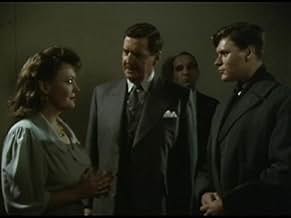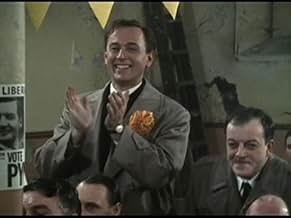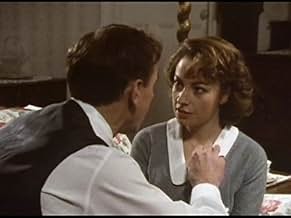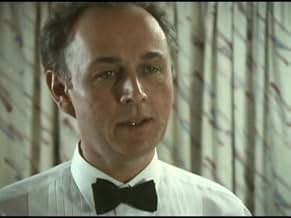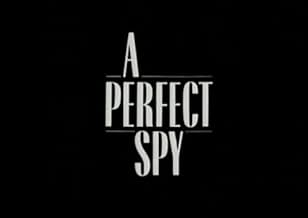A Perfect Spy
- TV Mini Series
- 1987
- 6h 14m
IMDb RATING
7.3/10
1.1K
YOUR RATING
The rise and fall of Magnus Pym and his career through intelligence. From chance meetings with people will be important to him in the future to a life in Czechoslovakia, Pym weaves his way t... Read allThe rise and fall of Magnus Pym and his career through intelligence. From chance meetings with people will be important to him in the future to a life in Czechoslovakia, Pym weaves his way through the complicated world of espionage.The rise and fall of Magnus Pym and his career through intelligence. From chance meetings with people will be important to him in the future to a life in Czechoslovakia, Pym weaves his way through the complicated world of espionage.
- Nominated for 2 Primetime Emmys
- 1 win & 6 nominations total
Browse episodes
Featured reviews
This is an extremely long movie, which means you may become very bored before it becomes interesting, but its length provides opportunity for its characters to find permanent attachment in your sympathies.
If you are moved by the guilt of the loathsome you will find it particularly heart-wrenching, because it is a story that finds its heroes among the evil and the weak. If you can love a monster you'll cry for Magnus Pym, the spy who betrays everyone - notably his country, his friends and family - a man who has also been manipulated and moulded since childhood by those same people.
There isn't one truly likeable character in the entire story, not one loyal, 'moral' personality to sympathise with. But watching the whole thing without the help of a tissue would be quite remarkable.
I really enjoyed it in the end. Well worth it for people who like inciteful movies about baser human character.
If you are moved by the guilt of the loathsome you will find it particularly heart-wrenching, because it is a story that finds its heroes among the evil and the weak. If you can love a monster you'll cry for Magnus Pym, the spy who betrays everyone - notably his country, his friends and family - a man who has also been manipulated and moulded since childhood by those same people.
There isn't one truly likeable character in the entire story, not one loyal, 'moral' personality to sympathise with. But watching the whole thing without the help of a tissue would be quite remarkable.
I really enjoyed it in the end. Well worth it for people who like inciteful movies about baser human character.
If Smiley's People and Tinker Tailor Spy were about the "how" of espionage, A Perfect Spy is about the "who".
Whereas the first two were essentially two long investigations, A Perfect Spy, which begins as a non-linear story line in the novel, is about the socio-psychological components of what goes into making a spy.
While those who have read the book will find this adaptation surprising, it is also one of the finest. The story is linear, starting with a young Magnus, his con father, and his acolytes.
The background of the series is about the issue of what I would call inverted loyalties. Time and again, we see Magnus' relationship with his father as one where the former is criminally tolerant and indulgent, as any son with a deranged father might. During Magnus' childhood, and through his mentoring by Jack Brotherhood, we see an individual with divided loyalties, but seemingly true to both.
What this creates for the viewer is the impression that the good guys are actually bad, and vice versa, without resorting to any literary or artistic device. For example, we see immediately that Axel is initially harmless, but while he does something objectionable, nevertheless remains very attaching. For Magnus, it is the same. The buildup of his character during childhood only strengthens our sympathy for him. The reality is only revealed when Egan's character towards the end, when the Americans are catching on) starts to decompose.
To my taste, the series spends too much time on the childhood of the hero character. There are also devices taken from the book that are clearly unnecessary for the series (the green filing cabinet for example), and the relationship with Brotherhood could have been expanded, for the sake of balance with that of Axel Hampel.
Not to be sexist, but the women in the series are simply annoying. Also, their role in Magnus', Jack's professional lives and the spy craft is merely as sex-pots, which doesn't always conform to the zeitgeist. Although this was perhaps truer in the 1970s, when the novel's action was taking place. Also, some people don't seem to age, yet, they've been apparently working since the end of WW2; i.e. Jack Brotherhood, from 1947 to 1987 without a grey hair...
Overall, however, we see compelling acting. Egan, MacAnally, Weigang at the summit of their art.
The last ten minutes of the series is the finest acting ever filmed or seen.
Whereas the first two were essentially two long investigations, A Perfect Spy, which begins as a non-linear story line in the novel, is about the socio-psychological components of what goes into making a spy.
While those who have read the book will find this adaptation surprising, it is also one of the finest. The story is linear, starting with a young Magnus, his con father, and his acolytes.
The background of the series is about the issue of what I would call inverted loyalties. Time and again, we see Magnus' relationship with his father as one where the former is criminally tolerant and indulgent, as any son with a deranged father might. During Magnus' childhood, and through his mentoring by Jack Brotherhood, we see an individual with divided loyalties, but seemingly true to both.
What this creates for the viewer is the impression that the good guys are actually bad, and vice versa, without resorting to any literary or artistic device. For example, we see immediately that Axel is initially harmless, but while he does something objectionable, nevertheless remains very attaching. For Magnus, it is the same. The buildup of his character during childhood only strengthens our sympathy for him. The reality is only revealed when Egan's character towards the end, when the Americans are catching on) starts to decompose.
To my taste, the series spends too much time on the childhood of the hero character. There are also devices taken from the book that are clearly unnecessary for the series (the green filing cabinet for example), and the relationship with Brotherhood could have been expanded, for the sake of balance with that of Axel Hampel.
Not to be sexist, but the women in the series are simply annoying. Also, their role in Magnus', Jack's professional lives and the spy craft is merely as sex-pots, which doesn't always conform to the zeitgeist. Although this was perhaps truer in the 1970s, when the novel's action was taking place. Also, some people don't seem to age, yet, they've been apparently working since the end of WW2; i.e. Jack Brotherhood, from 1947 to 1987 without a grey hair...
Overall, however, we see compelling acting. Egan, MacAnally, Weigang at the summit of their art.
The last ten minutes of the series is the finest acting ever filmed or seen.
Without doubt the best of the novels of John Le Carre, exquisitely transformed into a classic film. Performances by Peter Egan (Magnus Pym, The Perfect Spy), Rudiger Weigang (Axel, real name Alexander Hampel, Magnus' Czech Intelligence controller), Ray McAnally (Magnus' con-man father) and Alan Howard (Jack Brotherhood, Magnus' mentor, believer and British controller), together with the rest of the characters, are so perfect and natural, the person responsible for casting them should have been given an award. Even the small parts, such as Major Membury, are performed to perfection. It says a lot for the power of the performances, and the strength of the characters in the novel that, despite the duplicity of Magnus, one cannot help but feel closer to Magnus and Axel than to Jack Brotherhood and the slimy Grant Lederer of U.S. Intelligence. I have read the book at least a dozen times, and watched the movie almost as many times, and continue to be mesmerized by both. If I had one book to take on a desert island, A Perfect Spy would be the choice above all others.
I rather liked this BBC TV adaptation of John le Carré's highly regarded book.
Very difficult to give it a rating! In the end, I've settled on 7, although some aspects warranted 8 or more.
This TV version of The Perfect Spy was aired by the BBC in 1987. It is very dated in the way it looks, the cold war spy story, the way it's told, and the way the screenplay is constructed. TV drama series just don't look like or do this anymore. It's 37 years old. Also, it's sloooow burn - a mood piece, which relies on some talking heads, tense room situations, and a sprinkling of violin music. It's OK actually! I'm of an age now where I can appreciate this sort of thing. If you want wham-blam - then you are looking in the wrong place!
Benedict Taylor, and then Peter Egan are Magnus Pym - a spy who plays for both sides. In a sense, this is not the most important thing here though. In it's place, the thing offered is that the Magnus Pym character is unmoored. He doesn't seem to have any moral code. This, in part, must be due to his father "Rick" Pym, played brilliantly by Ray McAnally. He is a crook of the worst kind, defrauding anyone he can get money out of. Because McAnally plays the father so well, we get a sense of the reverence he elicts from his son in earlier years. But he is the worst kind of role model, full of smooth emotional blackmail. I liked the way that "Rick" keeps popping up over time. In the end, confused and frustrated by his influence, Magnus tries to keep him away. It's as if Magnus is running away from him and everything he represents. But he doesn't really escape, he simply evolves into another version of his father. We see this especially towards the end. That's my interpretation anyway.
There is a lot going on in The Perfect Spy, with many relationships - most of which are damaged, manipulative and inauthentic. Perhaps the most important and defining pairing, is Magnus's lonstanding & influential friendship with Axel Hampel - a Czech agent, played wonderfully by Rüdiger Weigang.
In the end, Magnus Pym is a moral desert - a game player who never comes to terms with who he is, what he does, or why he does it.
The Perfect Spy falls down a little in a few places. We don't see what Magnus really does, and only some of the influence he really has. We find it hard to keep up with the female characters - who are often used and mistreated. There are gaps and failures to explain or give insight. Instead, we see what Magnus comes to realise only at the end....
Very difficult to give it a rating! In the end, I've settled on 7, although some aspects warranted 8 or more.
This TV version of The Perfect Spy was aired by the BBC in 1987. It is very dated in the way it looks, the cold war spy story, the way it's told, and the way the screenplay is constructed. TV drama series just don't look like or do this anymore. It's 37 years old. Also, it's sloooow burn - a mood piece, which relies on some talking heads, tense room situations, and a sprinkling of violin music. It's OK actually! I'm of an age now where I can appreciate this sort of thing. If you want wham-blam - then you are looking in the wrong place!
Benedict Taylor, and then Peter Egan are Magnus Pym - a spy who plays for both sides. In a sense, this is not the most important thing here though. In it's place, the thing offered is that the Magnus Pym character is unmoored. He doesn't seem to have any moral code. This, in part, must be due to his father "Rick" Pym, played brilliantly by Ray McAnally. He is a crook of the worst kind, defrauding anyone he can get money out of. Because McAnally plays the father so well, we get a sense of the reverence he elicts from his son in earlier years. But he is the worst kind of role model, full of smooth emotional blackmail. I liked the way that "Rick" keeps popping up over time. In the end, confused and frustrated by his influence, Magnus tries to keep him away. It's as if Magnus is running away from him and everything he represents. But he doesn't really escape, he simply evolves into another version of his father. We see this especially towards the end. That's my interpretation anyway.
There is a lot going on in The Perfect Spy, with many relationships - most of which are damaged, manipulative and inauthentic. Perhaps the most important and defining pairing, is Magnus's lonstanding & influential friendship with Axel Hampel - a Czech agent, played wonderfully by Rüdiger Weigang.
In the end, Magnus Pym is a moral desert - a game player who never comes to terms with who he is, what he does, or why he does it.
The Perfect Spy falls down a little in a few places. We don't see what Magnus really does, and only some of the influence he really has. We find it hard to keep up with the female characters - who are often used and mistreated. There are gaps and failures to explain or give insight. Instead, we see what Magnus comes to realise only at the end....
I clearly missed the joke behind this series. How does a man so gullible climb his way through the ranks of British intelligence? Maybe that was Le Carré's point; that any idiot could have been "a spy" during the cold war, and that it was exactly his stupidity that kept him unwittingly "under the radar"...Either way, I came away feeling extremely annoyed at the end.
Did you know
- TriviaAccording to source novelist John le Carré, the character of Rick Pym (Ray McAnally) is heavily based upon his own father.
- ConnectionsFeatured in Wogan: Episode #9.10 (1989)
- How many seasons does A Perfect Spy have?Powered by Alexa
Details
- Release date
- Country of origin
- Language
- Also known as
- John le Carré's A Perfect Spy
- Production companies
- See more company credits at IMDbPro
Contribute to this page
Suggest an edit or add missing content







